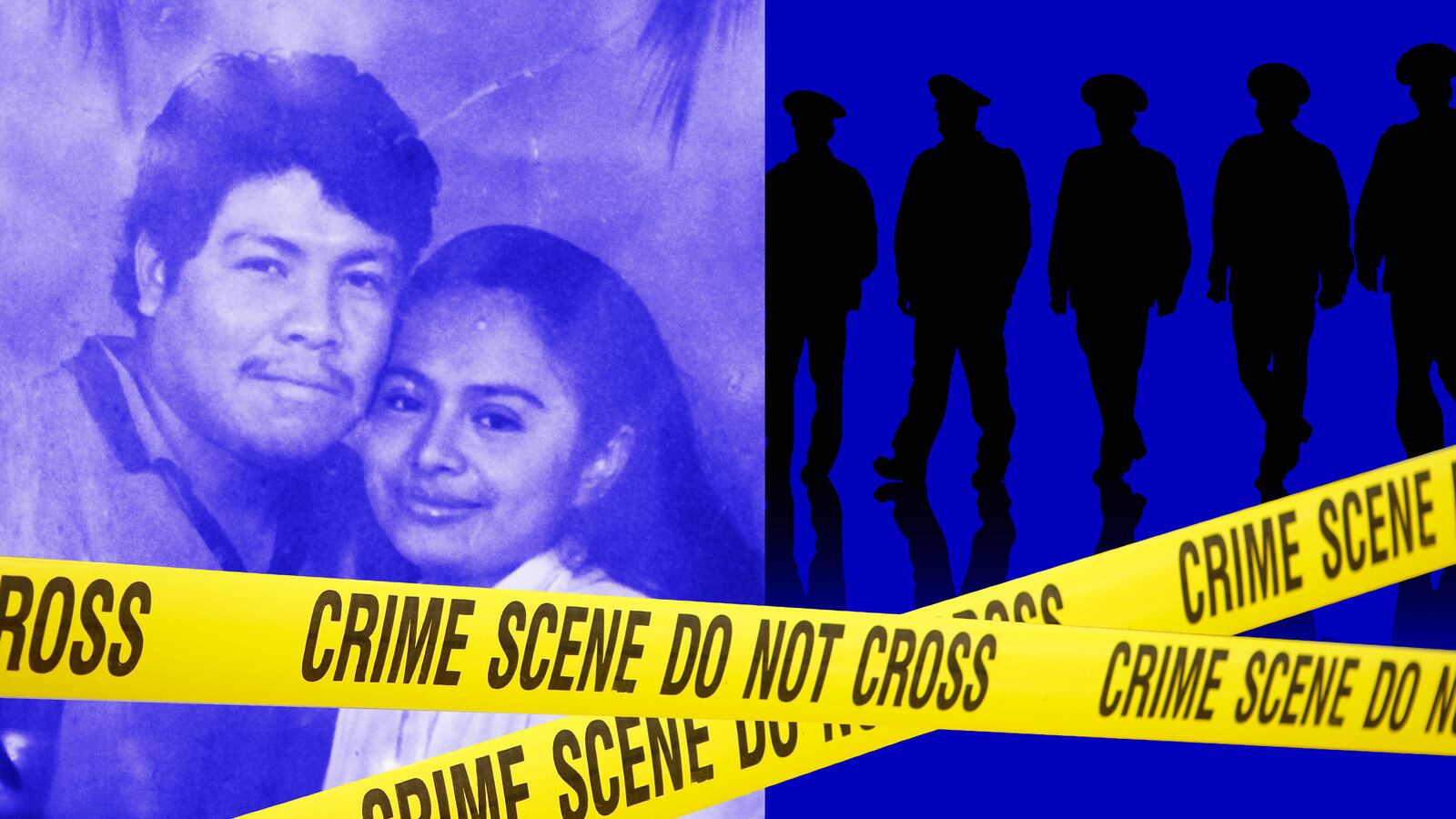Ismael Lopez was killed by police who came to his home in the middle of the night looking for an alleged domestic abuser who actually lived across the street. Nearly a year later, the authorities continue to shield the identities of the cops who killed him and won’t allow for a public accounting of the many mishaps that led to Lopez’s needless death.
Lopez was a Mexican-born immigrant who worked without documentation as an auto mechanic for the City of Bartlett, Tennessee. Across the state line in Southaven, Mississippi on July 23, 2017 he was asleep in his home when, according to his wife, Claudia, their barking pit bull woke the couple from their slumber. Ismael got out of bed to investigate. Moments later he was dead after a bullet ripped through the back of his skull.
The Southaven Police Department says Lopez aimed a rifle at them through a crack in the door and refused repeated orders to drop the weapon. Lopez’s wife says she never heard anyone call for a gun to be dropped, just the sounds of gunfire.
What is certain is that Lopez had no criminal record and was not the subject of any warrants. By all accounts he was a pillar of his community, yet he died in his own home at the hands of public servants tasked with protecting people like him.
Lopez’s 22-year-old son, Rodolfo—like his parents, an undocumented immigrant but protected (at least for now) by the Deferred Action for Childhood Arrivals policy (DACA)—told The Daily Beast in a phone interview that his father was a hard-working, generous person. known to help elderly neighbors with yard work or automotive maintenance. “Nothing’s going to bring my dad back,” Rodolfo mournfully concedes through a distinct Southern twang, “but I want the truth to come out, and justice.”
The truth has been hard to come by, with the city denying public records requests and an investigation by DeSoto County and the Mississippi Bureau of Investigations dragging on for over nine months with no estimated timeframe for resolution.
Hours before Lopez was killed on July 23 in Tate County, Tennessee, Samuel Pearman’s ex-girlfriend accused him of choking her at a gas station, prompting the Tate County Sheriff’s department to reach out to their counterparts across the state border in Southaven. The goal was for the local police to apprehend Pearman at his Southaven address and turn him over to Tate County, where he could be charged with aggravated domestic violence.
Though Pearman’s house was marked with a large street-facing “P” on its façade, Southaven officers moved on a trailer on the opposite side of the street—where two signs were nailed to a tree indicating that both a dog and a gun-owner resided on the property. That trailer was Lopez’s home.
As related to reporters by DeSoto County District Attorney John Champion the next day, the two officers (who were not wearing body cameras) on the scene claim they knocked on the door and loudly announced their presence. In their telling, a pit bull then charged out of the trailer without warning, prompting one of the officers to shoot the animal in the head and leg. The dog somehow survived.
Then, the officers claim, a man appeared through a crack in the partially opened front door, pointing a rifle at them. The officers say they repeatedly shouted for the man to drop the gun. When he refused to comply, they fired three rounds at him.

Many of Lopez’s neighbors, disturbed by the sound of gunfire late on a Sunday night, came outside to investigate the source of the commotion. One of those neighbors was Pearman, who police quickly identified as the target of arrest which mistakenly brought them to Lopez’s home in the first place. But after speaking with Pearman, the police let him sleep in his own bed that night. (Pearman would be arrested a few days later on the same charges, which he denies.)
Mrs. Lopez and neighbors later interviewed by private investigators working on behalf of the family’s legal team say they never heard orders for anyone to drop a weapon. Mrs. Lopez admitted that the family kept two guns in the home, including a rifle in the living room. Police later seized the rifle as evidence.
An analysis of the crime scene by the private investigators may also shed doubt on the police version of events. The officers fired from a position to the right of the front door, sending three bullets through the door at an angle that the private investigators say would have been impossible had the door been opened. The investigators added that no blood was found outside the home, which conflicts with the officers’ statement that the family pit bull charged at them. According to Aaron Neglia, an attorney representing the Lopez family, the wounded dog had been guarding Lopez’s body when police entered.
Neglia and his colleague Murray Wells held a press conference last December where they provided reporters with more evidence that they say contradicts the officers’ claims of facing a potentially lethal threat of an armed, non-compliant man aiming a weapon at them. According to Neglia, Lopez’s body fell some 14 feet from the door—an impossible distance for him to have reached had he been standing next to the door, as police have claimed. Though Lopez’s autopsy has yet to be released, Neglia, a two-tour Iraq War combat veteran tells The Daily Beast, “I personally viewed the body and the massive hole in the back of his head. He died before he hit the ground.”
When authorities have provided any information at all regarding the shooting, it has been unusually censored, and sometimes plainly inaccurate.
The police incident report provided to the family—which lists the deceased Lopez as “offender” and his race as “white”—is significantly redacted, even though Mississippi law clearly states, “An incident report shall be a public record.” To this day the identities of the officers remain secret—the attorney for Southaven having cited the Mississippi Attorney General’s interpretation of the state’s Public Record Act that “personnel records in the possession of a public body are confidential.” Neglia describes this interpretation as “wrongful” and meant to benefit the police and city’s interests. Last September, Neglia told reporters that a “reliable source” provided him with the names of the officers involved, whose identities match up with a publicly available list of officers on duty in Southaven on the night of Lopez’s shooting.
Southaven Police Chief Steve Pirtle told the DeSoto Times-Tribune last December that he chose to recuse the department from the investigation—turning the matter over to the Mississippi Bureau of Investigations (MBI) and DeSoto County District Attorney John Champion, who said he expected the MBI to complete its report in 6-8 weeks. That was in August 2017.
Champion told The Daily Beast in a phone interview that the reason his estimate missed the mark is that “back then we had a lot more medical examiners.” In his estimation, there were four medical examiners performing autopsies for the state of Mississippi—a number which eventually dropped to just one. Champion says that the medical examiner who performed Lopez’s autopsy has since left her job with the state, but never submitted her report.
Champion confirmed that MBI has completed its investigation, which includes the crime scene report and witness statements, and he has been in possession of MBI’s final report since some time “after the first of the year,” but he will not release the report until he has received the state medical examiner’s autopsy. Only once he has seen analysis of bullet trajectories and determined whether the science conforms with witness statements will Champion decide on whether to refer the case to a grand jury. Champion added that he is unsure anything was redacted on the initial incident report, other than the names of the officers, which he says is not unusual.
Mississippi’s long-underfunded and backlogged medical examiner’s office now leaves one of the state’s most high-profile shooting deaths in legal limbo, ostensibly because a former state employee never submitted her paperwork. There is no timeframe available as to when the state plans to make the final investigation of Ismael Lopez’s death at the hands of police a priority.
Chief Pirtle declined to comment pending the release of the State Medical Examiner’s final report, and multiple requests for comment from Warren Strain, the press representative for MBI and the State Medical Examiner’s office, went unreturned.
“We want to know who the shooters were,” Neglia says, “But we have gotten no response from the district attorney, the police chief or the Department of Justice, even though the DOJ requires responses for civil rights cases.”
Having represented victims of police shootings before, Neglia tells The Daily Beast he has never seen an investigation persist for anywhere close to the nine months and counting of Lopez’s case. Moreover, Southaven’s police force has faced recent accusations of excessive force. But under Attorney General Jeff Sessions, federal oversight of local police departments has been significantly de-prioritized.
There is no doubt Lopez’s death could have been avoided, the question that remains is will anyone ever be held accountable for it.




